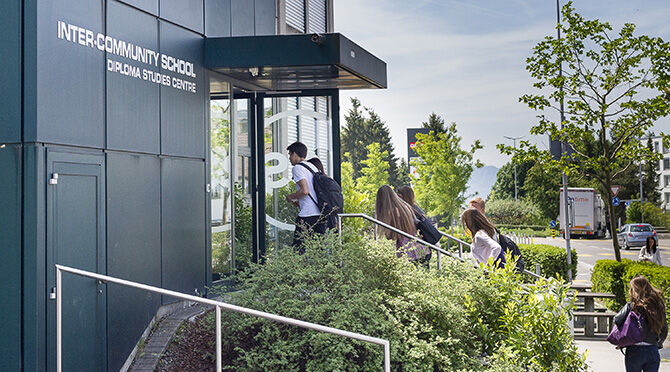Living abroad with teenagers: opportunities and challenges
Living overseas, away from our familiar comforts, presents both opportunities and challenges, especially for children and adolescents, explains Gil Woodley, of the Inter-Community School Zurich.

Benefits and challenges of being a ‘third-culture kid’
Researchers have identified some important characteristics that third-culture kids share. For example, they are often able to develop friendships quickly and at a deeper level, because they have had to do so with each move. They are self-confident, possessing flexibility, adaptability and often a high degree of independence. They often become innovators and leaders. In addition, teenagers may exhibit higher levels of maturity than their home-based counterparts.Importantly, they also develop the ability to move between cultures, through their linguistic skills and their cross-cultural awareness. They develop what David C Pollock calls a “three-dimensional world view” because it includes not only knowledge but also understanding and empathy.Pollock says, “The sense of security in getting around in the world and acting appropriately in it is significant preparation. The person can become a cultural bridge and an active, positive influence in an increasingly intercultural world.”So there are many powerful benefits that come from living internationally, but there are some challenges. For example, during the adolescent years, young people are working out their identities, distinct from their parents, and friends and peers become central to their lives.Since many teenagers at this stage of development feel emotions intensely, the kinds of disruption – to social life, sense of stability, and so on – that they experience during moving can put a great deal of stress on them and their families.The research into third-culture kids gives us some strategies for dealing with the impacts of such transitions. The first point to emphasise is how central the family is to the well-being and sense of stability of third-culture children. For third-culture kids, relationships are more important than geography, and their families become extremely important in providing a centre to their lives.
They are self-confident, possessing flexibility, adaptability and often a high degree of independence. They often become innovators and leaders. In addition, teenagers may exhibit higher levels of maturity than their home-based counterparts.Importantly, they also develop the ability to move between cultures, through their linguistic skills and their cross-cultural awareness. They develop what David C Pollock calls a “three-dimensional world view” because it includes not only knowledge but also understanding and empathy.Pollock says, “The sense of security in getting around in the world and acting appropriately in it is significant preparation. The person can become a cultural bridge and an active, positive influence in an increasingly intercultural world.”So there are many powerful benefits that come from living internationally, but there are some challenges. For example, during the adolescent years, young people are working out their identities, distinct from their parents, and friends and peers become central to their lives.Since many teenagers at this stage of development feel emotions intensely, the kinds of disruption – to social life, sense of stability, and so on – that they experience during moving can put a great deal of stress on them and their families.The research into third-culture kids gives us some strategies for dealing with the impacts of such transitions. The first point to emphasise is how central the family is to the well-being and sense of stability of third-culture children. For third-culture kids, relationships are more important than geography, and their families become extremely important in providing a centre to their lives.How can you help children to cope with change?
Bill and Ochan Powell, two experts in the area of third-culture children, affirm the importance of stable families and state that “children need parents to share a strong set of values and beliefs with them (and if they don’t have that framework of values, it is damaging). They don’t necessarily need to have their roots in their national culture.”David C Pollock and Ruth E Van Reken, in their book Third Culture Kids: Growing Up Among Worlds, argue that the parent-to-child relationship is the most important factor in how international children face the challenges of living abroad. They argue that third-culture kids need to be valued, to be thought of as special, to be protected, and to be comforted.These factors are true for all children, but in the context of living far from home the need for this kind of care becomes acute. Pollock and Van Reken suggest some simple strategies that can help to meet the emotional needs of international children:- Parents can listen carefully to their children’s concerns and behaviour and try to understand the reasons for it
- They can value children’s contributions to discussions of things that will affect them, such as a global move
- They can also ensure that there is family time available for being emotionally (and physically) present
How can schools help to support children during the transition?
There are also a number of ways in which families can help their children to adjust when they relocate. The Powells suggest that parents should work with the school their child is leaving to support children in saying goodbye.Some international schools will also have programmes in place to assist both parents and children. Parents are well advised to take advantage of these and gain from the expertise available within the school community.For example, at the Inter-Community School (ICS) in Zurich, there is a well-established programme which has now been in place for several years to help with the transition into the new school and which can also assist families when they have to leave.After the move, parents can support children by helping them find new groups of friends and ways of connecting with others. Parents can also work to maintain bonds with family left behind at home, a process greatly assisted by current social-media technologies.Living abroad is a challenging, at times stressful, but ultimately rewarding experience for families who have the good fortune to do it voluntarily. As the Powells state, “In an increasingly interdependent world, we need people who are able to see things through the eyes of other cultures. That is a great opportunity for third-culture kids.“In many ways, children with an international education are at an advantage.”For further information about the Inter-Community School Zurich, visit http://www.icsz.ch
Now available as an ebook on Amazon! Simply download from Amazon onto your Kindle, mobile phone or tablet to read wherever you are!
For related news and features, visit our Education & Schools section.Access hundreds of global services and suppliers in our Online Directory
 Get access to our free Global Mobility Toolkit
Get access to our free Global Mobility Toolkit  © 2017. This article first appeared in the 2017 edition of the Guide to International Education & Schools, published by Profile Locations, Spray Hill, Hastings Road, Lamberhurst, Kent TN3 8JB. All rights reserved. This publication (or any part thereof) may not be reproduced in any form without the prior written permission of Profile Locations. Profile Locations accepts no liability for the accuracy of the contents or any opinions expressed herein.
© 2017. This article first appeared in the 2017 edition of the Guide to International Education & Schools, published by Profile Locations, Spray Hill, Hastings Road, Lamberhurst, Kent TN3 8JB. All rights reserved. This publication (or any part thereof) may not be reproduced in any form without the prior written permission of Profile Locations. Profile Locations accepts no liability for the accuracy of the contents or any opinions expressed herein.



























